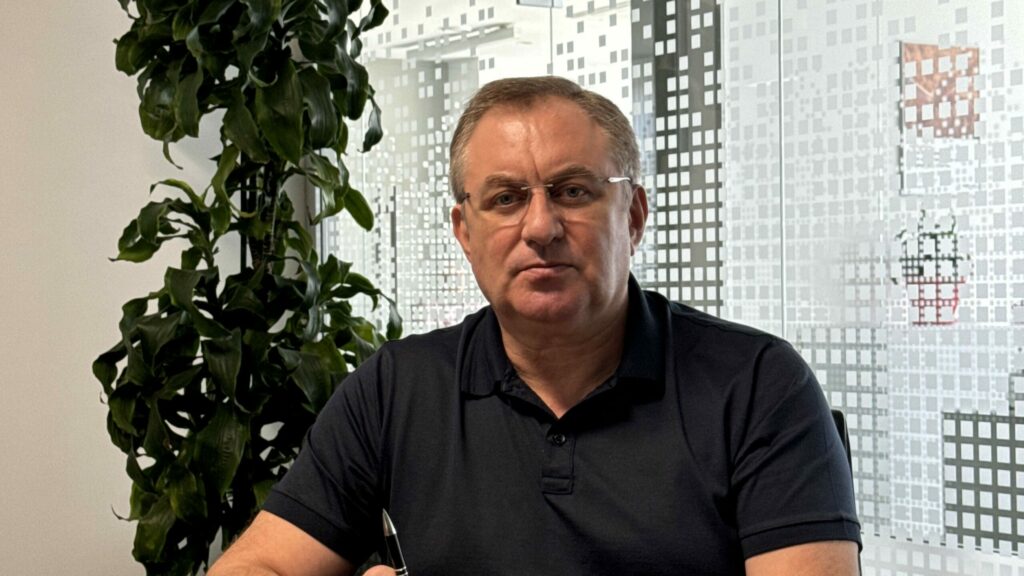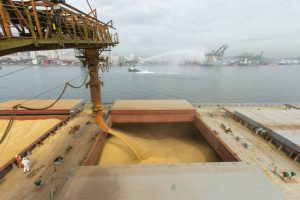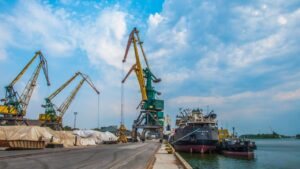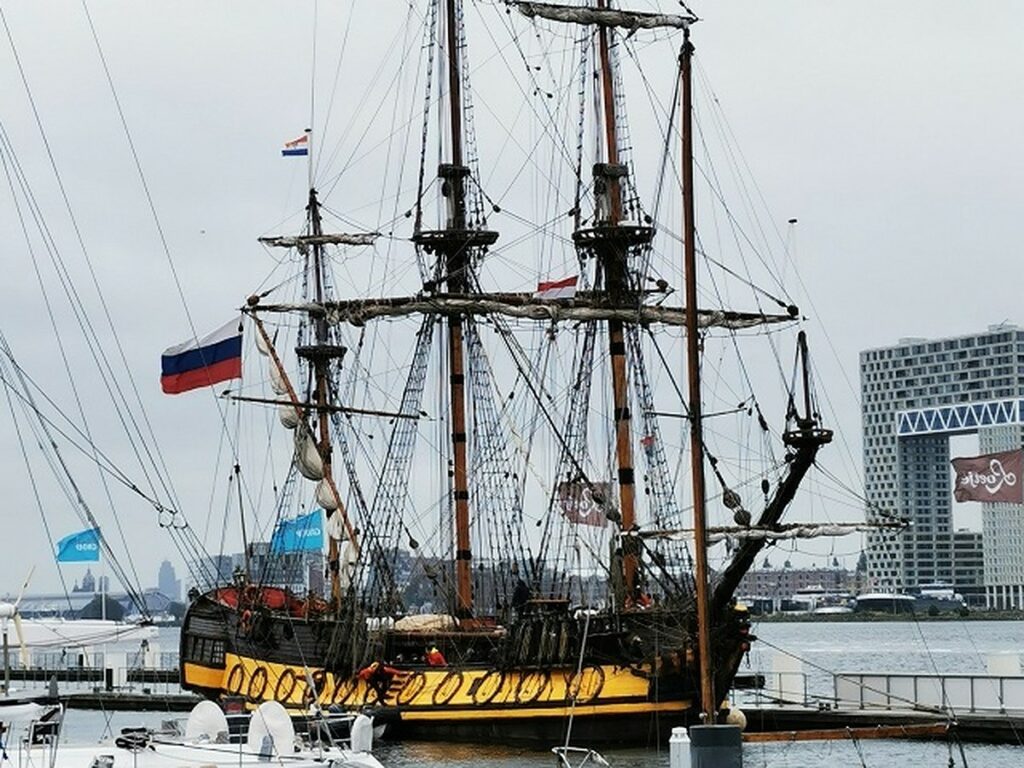The owner of the Ust-Dunaisk port Valerii Vihrenko: “After the war, this port will not be needed by anyone except us”

The owner of “Elixir Ukraine” LLC and the port of Ust-Dunaisk publicly commented on cooperation with “Kranship” for the first time, and also spoke about the state of operation of the Ust-Daunaisk port.At the beginning of 2023, Ukraine put up for auction and sold the state port for the first time.
Privatization is considered successful, at the starting price, the winner of the auction, Elixir Ukraine LLC, paid almost UAH 250 million, including VAT and the Prozorro commission.Before privatization, three operators worked on the territory of the Kilia post office: State Enterprise “MTP Ust-Dunaisk”, LLC “Kranship” and LLC “Grain Terminal Kilia” (“ZTK”). There was a long-standing conflict between the state-owned enterprise and ZTK. The ex-director of the port, Yuriy Martyniuk, said that the operator allegedly “captured the warehouse and other property of the state enterprise in a raid and does not pay anything for cargo storage.” According to Martyniuk, deputies from Mykola Tyshchenko’s entourage visited the port as a “support group” for the operator.
After privatization, the conflict continued. But already between the operator and the new owner. “ZTK” claims that they have the right to a certain share of the port’s property. Allegedly, the State Property Fund “did not carry out the correct distribution of property before privatization.” At the same time, “ZTK” had the opportunity to buy the port, but the company did not apply for the tender.
The trials are still ongoing. In principle, the situation is typical for Ukrainian privatization. No one was involved in cleaning up the asset. For sale was not a company, but a single property complex. However, the new owner understood who he was dealing with and what risks he would face.
The Danube is not often mentioned in the news these days. The volume of transportation through the Danube ports has decreased significantly this year, the direction is increasingly becoming peripheral. So the commotion in Ust-Dunaisk would not be worth paying attention to, if it were not for one circumstance. A few weeks ago, the publication “Hromadske” reported that Ust-Dunaisk had allegedly fallen under the control of “pro-Russian structures”, which constitutes a “threat to national security”.
Oleksandr Gramma, the son of the owner of ZTK, played the role of “whistleblower”. In the story of the publication, it is claimed that “Elixir Ukraine” allegedly transferred the port to “Kranship”. According to journalists, this is dangerous for the country, because “Kranship” belongs to Andriy Ivanov’s business group, because part of Ivanov’s business continued to work in Crimea after 2014.
Does Valerii Vihrenko really cooperate with “Kranship”
Since Oleksandr Gramma’s position is known and shared in many mass media, we decided to interview the other side of the conflict.
It is worth noting that the owner of Elixir Ukraine, Valerii Vyhrenko, is well-known on the Ukrainian agricultural market, but he is not very public. Mr. Valerii agreed to answer the questions, but on the condition that we publish his answers almost unedited.
Mr. Valerii, today there is another wave of rumors surrounding Ust-Dunaisk in the information space. Do you not regret investing in this project, spending almost $6 million?
That’s what my friends say to me, why do you need this Ust-Dunaisk? Why not just build a transshipment? But our own port on the Danube is a strategic issue for us. We have been thinking about it for a long time. You probably know that Elixir Ukraine LLC is a representative of the European manufacturer of mineral fertilizers Elixir Zorka. We import almost 150,000 tons annually. The owners modernized the factories, attracted the best specialists, developed formulas that allow them to produce a high-quality and modern product that competes on an equal footing with products from France and Norway. We started cooperation in 2017.
Before that, Elixir Zorka in Ukraine had problems. The importer sold only a few thousand tons per year. As it turned out later, he also sold fertilizers of unknown origin under the Elixir brand. The owners were looking for reputable partners who know the market and will be able to build a quality distribution. Over the past few years, we have increased the volume of sales by an order of magnitude. The Elixir Zorka factories are located on the Danube, so even before the war we organized transshipment at the port of Izmail. Why Ishmael? Before the war, the port of Kilia was dying, handling a maximum of 50-70 thousand tons per year. Port Reni was barely breathing. But Ishmael held on thanks to the railway. Through Izmail, the products of Ukrainian GOKs were exported and our fertilizers were imported.
How much did you pay for transshipment?
Approximately 2 million dollars per year. This is just transshipment, plus count the storage space. In February 2022, we had about 15,000 tons of products in our warehouses. Note that fertilizers are not bulk cargo. This is general cargo – soft containers (big bags) that require a lot of space. I occupied several hectares of the port territory with bags of fertilizers.
Since the beginning of the full-scale invasion, Odesa has been closed, and Izmail has been in a frenzy. The rate for transshipment reached 20 dollars per ton, they tell me – urgently remove fertilizers from the port. Somehow the bags were taken to warehouses. It became very difficult to work in Izmail. Therefore, we perceived the privatization of Ust-Dunaisk as a chance to organize not only our own transshipment, but also, most importantly, accumulation and storage.
I am talking about the importance of storage, because the Danube is not a railway. Do you remember the record shallow water in 2022, when everything almost stopped on the Middle Danube for several months? And we have contracts, we cannot interrupt the supply. In order to work with large clients in Ukraine, we need to accumulate quite large volumes. Keep at least 20,000 tons as a reserve. It is several hectares of area.
During the auction, the price of Ust-Dunaisk increased from UAH 60 million to over UAH 240 million including VAT. Is this the real price of the asset? Is it a consequence of the hype?
Before the war, Ust-Dunaisk was worth nothing. Everything was robbed, cluttered. Some of the objects are privatized through various schemes. Some of the port’s facilities are seized by one of the operators who, without documents, built a warehouse, transshipment, and equipped a weighing complex. But during the war, all assets on the Danube skyrocketed in value. Transshipment rates jumped to $20 per ton. Therefore, I understood that the price would be at least twice the starting price. But I did not expect that in the end we will pay more than 200 million.
As far as we know, there was a long-standing conflict between the management and the operator at the port. According to the ex-director of Ust-Dunaisk, the operator did not pay for the use of the infrastructure, seized the warehouse. Did you understand that you are “buying a ticket” to participate in the conflict?
We understood that it simply would not happen. But, to be honest, they could not predict the scale of the further confrontation…
What started your conflict?
After the tender, I was contacted by the owner of this infamous port operator, who today is contesting the privatization. Offered to share control over the port “50/50”. Just so you understand, these are the people I once paid in advance to supply a large batch of barley, but never received the goods. The money was also not returned. I sued them, but they transferred all assets to a new company and bankrupted the old one.
But I am a non-conflict person, my principle in business is not to give free rein to emotions, to find compromise solutions. So I say to the owner operator, “How do you envision ‘shared control’?” If you are ready to give me back half of the amount I paid for the port, let’s start talking.”
In response, they staged a war against me… Courts, deputies, in my opinion, a commissioned campaign in the mass media.
This operator has several privatized facilities on the territory of the port. What is their fate?
He has one conditionally “legal” property – a boiler room. The port once owed wages to the workers. The executive has seized the property of the port. The operator bought this property for pennies. So they got a boiler room, where they set up an office. As far as I know, without documents. However, this is history. We do not apply for a boiler room. But they unjustifiably placed a transshipment line, a warehouse, and other capital facilities on the territory of the port. All this is documented as “movable property”. We have offered to remove this property from our territory. It immediately began: “We have been here for twenty years, and who are you?”
What exactly is the other side objecting to?
Privatization is contested. Blocks everything possible as much as possible from the very beginning. We bought the port in February, and visited the facility in August. One of the people’s deputies came: “You don’t let them work, you block warehouses.” And how, I’m sorry, did his warehouses end up on our territory without documents? The deputy was asked – do you know how much taxes your friends paid for the year? The volume of transshipment is approximately 200,000 per year, calculate the income. And taxes? A little more than one million hryvnias? And our company paid one hundred million to the budget. Therefore, unlike our opponents, we do not have extra funds to invite people’s deputies.
After entering the port, you started cooperation with the operator “Kranship”. What is it connected with?
In the story published in the mass media, this topic is presented in a very manipulative manner. First, the state did not sell, and we did not buy the entire port. We bought the property complex of the state port operator. But the moorings remain in USPA. That is, control over the port’s activities was and remains in the hands of the state.
Asking questions about any threats is basically absurd. Do the authors of the plot understand this? It is difficult to say.
Secondly, “Kranship” has been operating in Ust-Dunaysk since 2017, and has been operating throughout the war. All this time, it did not threaten national security, but in the midst of the legal process between “ZTK” and us, it began to threaten? Now regarding cooperation with “Kranship”. When we arrived at the port, we immediately began the process of liquidation of the old enterprise, this was one of the conditions of privatization. Our cargo has already left, but the registration of a new operator is time. You cannot become an operator early because an operator must have certain equipment to meet the requirements. In the first months, I had to process the cargo by involving “Kranship”. And how else? Contact the second operator who declared war on us? We leased the equipment to Kranship, because we could not use it without the status of a port operator.
We are currently working through our own operator. Some employees of “Kranship” were hired. Do you think there is a large selection of crane operators with experience in Kilia? I honestly don’t understand why I have to make excuses for it.
“Kranship” is associated with businessman Andrii Ivanov, who is considered “pro-Russian”…
I am definitely not Ivanov’s lawyer. But, in my opinion, “pro-Russianness” is a label artificially imposed on him by business competitors. I know that after 2014 he took the fleet into controlled areas. He himself got into the Russian Federation under sanctions. As far as I know, I did not have time to close only one of the agency companies. She allegedly has not been working for a long time. How can Ivanov physically close it, if he is in the Russian Federation under sanctions?
They tried to open some cases against Ivanov, and immediately rushed to come to an agreement. What is the current status of these cases? Are there suspicions, are there court decisions? As far as I know, Ivanov cooperates very closely with well-known American traders. The Americans, I think, checked all his business, all his connections. But again, I’m not his lawyer, not his business partner. Maybe I don’t know some facts. In any case, by cooperating with “Kranship”, we did not violate the legislation of Ukraine.
And why, in your opinion, did Ivanov not try to buy the port? He worked there for many years.
Why didn’t you try? I later learned from my own sources that I tried. He did not expect us to have such an amount. Instead, we agreed on a loan, pledged the elevator to the bank. My opinion is that Ivanov had no motivation to bargain to the last, because in the future Ust-Dunaisk will not be needed by anyone except me.
Why do you think so? Grain, although not in such volumes, continues to be exported through the Danube.
Before the war, there was no grain export from Ukraine in the Danube ports. After the war, we will return to this again. Grain terminals are currently half-empty, and in the future they will be completely empty. And we will continue to import fertilizers, as we have been importing. Stable 200 thousand tons per year. What’s more, if the Dnipro opens, we will start from Ust-Dunaisk to deliver to Kherson Oblast, because water logistics is the cheapest. Even before the war, they discussed this with the late Oleksiy Vadaturskyi (founder of the Nibulon company, editor’s note). But even under the existing conditions, the investment in the port will pay off in 5-6 years…
In a comment to journalists, you said that you are buying out other assets of “Kranship”.
The owners will sell off the assets. Anyone can buy. you can buy For some time I have considered a proposal to purchase the entire company. But Krunship has assets that I don’t need. We have given up the option of becoming a shareholder and are buying up individual objects.
What does selling a business entail?
A lot has changed since the end of last year. Odesa reached the pre-war volume of exports. The Danube is not counted as a grain export destination, almost not counted. The Danube ports lose to the large ports of Odessa. Ishmael still has a perspective, because it is a railway. There is no railway in Ust-Dunaisk. Therefore, the sooner you get rid of assets on the Danube, the more you will get for them. It is my opinion.
But on the contrary, you continue to buy assets, in particular, you bought the elevator “Strumok”?
Not only the elevator, we bought a site with transshipment 40 kilometers away. I will tell you a little story so that you can better understand our logic. From 1996 to 2007, I worked for Glencore. Actually started trading in Ukraine. Already later, Bunge, ADM, Louis Dreyfus and others appeared. For a while, I managed a fairly large agricultural holding, and eventually returned to trading. But in Ukraine, it is difficult for a local player, even with experience, to compete with large international traders, so we started importing fertilizers.
However, we have never stopped trading on the Middle Danube. It was developed quite successfully. We are among the leaders. We have elevators, transshipment complexes. When war broke out in Ukraine, international traders took a “wait and see” position. As a result, we returned to the Ukrainian market again. Having a huge experience of working on the Danube, they came to the aid of Ukrainian agricultural producers. After the purchase of the port, we planned to redirect our grain volumes to Ust-Dunaisk.
But it is technically difficult to deal with both fertilizers and grain on the same site. Therefore, we plan to use the 40th kilometer for grain export. Kilia port will remain a “clean port” for general cargo.
But you claim that in the future there will be no Ukrainian grain on the Danube?
This is true, but as long as the war continues, as long as there are military risks, high rates for transshipment in Odesa, a certain volume of exports through the Danube will be maintained. Even if all exports from Ukraine are redirected to Odesa, we will be able to use the elevator to store fertilizers. It makes sense for me to “select” cheap assets from the market. We know how to repurpose them in the future, already after the war.
When will the “war” in Ust-Dunaisk itself end?
It would have ended a long time ago, but amazing things are happening. For example, our opponents have no reason to obtain the status of a port operator. The documents were completed last year, they cannot issue new ones. That’s why they sue the Public Prosecutor’s Office, lose and file again. One lawsuit after another, that’s how time drags on. Can you imagine? Of course, this cannot last forever. Let’s see what else they come up with. But no one will be able to rob us, as they robbed the state port before.





